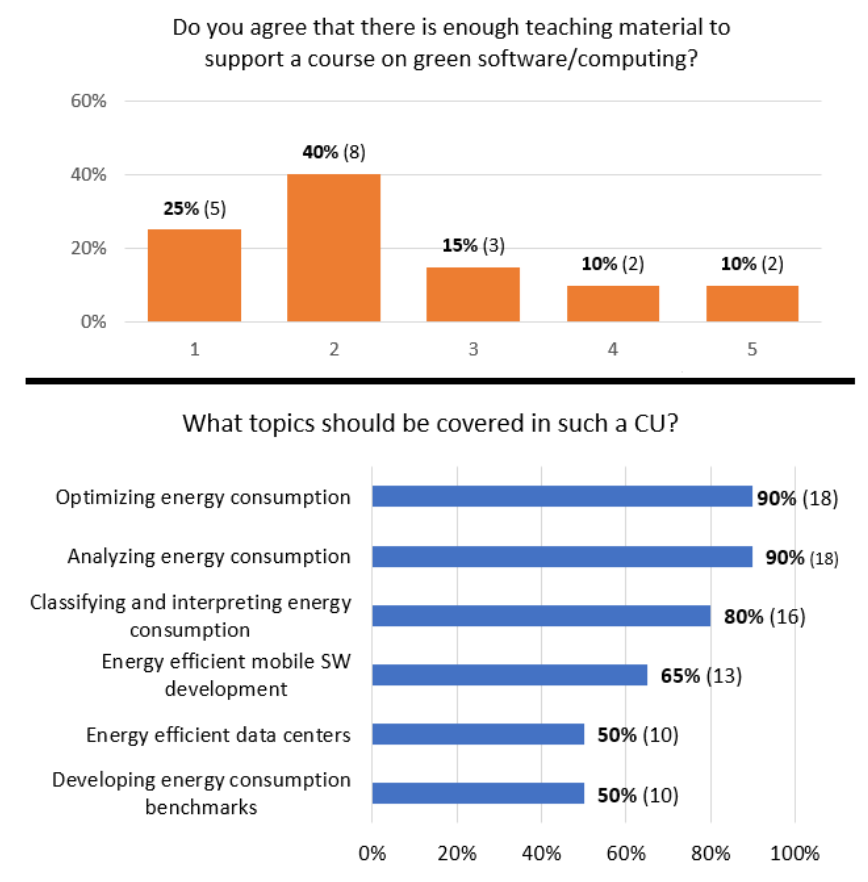| Infokasten |
|---|
Diese Wiki-Seite dient zum Sammeln von Informationen, wie Nachhaltigkeitsaspekte in die Lehre an der Universität Stuttgart integriert werden könnten. Hierzu lohnt sich insbesondere der Blick auf andere Hochschulen. |
Aktueller Stand
Bedeutung "Nachhaltigkeit in der Informatik"?
...
| Name | Hochschule | Verpflichtend? Wahlmodul? | Umfang | Inhalte | Anmerkungen |
|---|---|---|---|---|---|
| Ways of Thinking in Informatics | TU Wien | Informatik-Studierende im ersten Bachelor-Jahr | 6 LP |
| |
| Sustainable Technology | Hochschule Trier |
| |||
| Nachhaltige Softwaretechnik | Umwelt-Campus Birkenfeld (Hochschule Trier | Wahlmodul | 5 ECTS |
| Dozent: Prof. Dr. Stefan Naumann Teil der Vertiefungsrichtung Sustainability and Information Systems |
| Nachhaltigkeit und IT | Uni Würzburg | Pflicht für Studierende des Studiengangs "Informatik und Nachhaltigkeit" | 5 ECTS |
| |
| Energy-Aware Engineering | Uni Würzburg | 5 ECTS |
| ||
| Technik und Ethik | TU Graz | Pflicht für Studierende des Studiengangs "Information and Computer Engineering" | 2 ECTS | In der Lehrveranstaltung werden soziale, ethische und rechtliche Aspekte des Informations- und Computer Engineerings thematisiert. Nach einer generellen Einführung in ethische Theorien zu Technik fokussiert die Lehrveranstaltung auf zentrale ethische und rechtliche Herausfordungen von ICE. Anhand von Fallbeispielen werden aktuelle Fragestellungen, Konflikte und öffentliche Debatten sowie Normsetzungprozesse diskutiert. | |
| Green Software Engineering | University of Minho | Wahlmodul im Master-Programm Software Engineering | Objectives:
| Siehe Paper: Saraiva, J., Zong, Z., & Pereira, R. (2021). Bringing Green Software to Computer Science Curriculum: Perspectives from Researchers and Educators. Proceedings of the 26th ACM Conference on Innovation and Technology in Computer Science Education V. 1, 498–504. https://doi.org/10.1145/3430665.3456386 | |
| Texas State University | Wahlmodul im Ph.D.-Programm Computer Science | Objectives:
| Siehe Paper: Saraiva, J., Zong, Z., & Pereira, R. (2021). Bringing Green Software to Computer Science Curriculum: Perspectives from Researchers and Educators. Proceedings of the 26th ACM Conference on Innovation and Technology in Computer Science Education V. 1, 498–504. https://doi.org/10.1145/3430665.3456386 | ||
| Service Oriented Design | Vrije Universiteit Amsterdam | Bei Wahl der Vertiefungsrichtung "Software Engineering and Green IT" verpflichtend | 6 ECTS |
| |
| Green Lab | Vrije Universiteit Amsterdam | Bei Wahl der Vertiefungsrichtung "Software Engineering and Green IT" verpflichtend | 6 ECTS |
| |
Spezialisierte Studiengänge zu "Informatik & Nachhaltigkeit"
...
- "While research in green software is rapidly increasing, several recent studies with software engineers show that they still miss techniques and tools to develop greener software"
- "In fact, all those recent studies show that academia should not only advance state-of-the-art research in green software design, but also educate software engineers towards greener software development. Obviously, this education is best provided from the very beginning of a software engineer career. Unfortunately, today’s undergraduate computer science (CS) education often fails to address our social and environmental responsibility"
- "Question: On a scale of (Highly Disagree) 1-5 (Highly Agree), do you agree that there is enough teaching material available to support a course on green software/computing?"
- "The quickly surging demand for energy efficient computing makes it no longer sufficient for traditional computer science curriculum to train our students with only performance-oriented programming skills and mindset. It is paramount to encourage students to "think green" and write greener code."
Topics covered by the master level course "Green Software Engineering" (University of Minho):
- strategic and aspect oriented programming (compute metrics and transform/refactor source code)
- monitor energy consumption (with RAPL)
- Red smalls + green refactorings (e.g. greeness of Java collections)
- Concept "Energy debt" + monitoring (with E-Debitum plugin for SonarQube)
- fault localization techniques e.g. SPELL)
- Automatic energy-aware program repair
- "We strongly recommend integrating green computing/software modules “early” and “often” to existing courses in a way that enhances what is already taught and that melds naturally in a given course."
...
